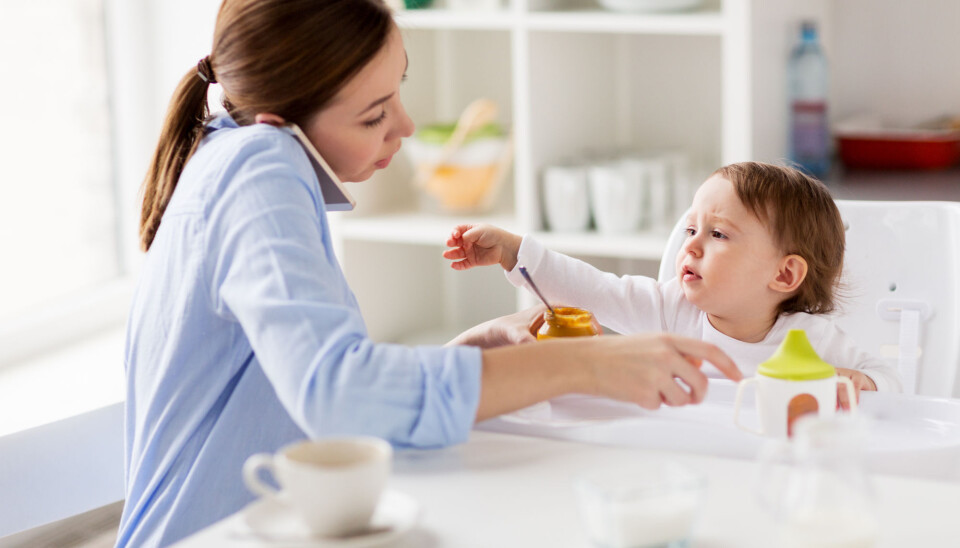
Checking your phone during meals may create unhealthy eating habits for your child
You wouldn’t be alone if you check your phone while feeding your toddler. But you should be aware that this may teach your children negative things about meals and eating, researchers say.
Norwegian researchers asked 300 parents whether they use their mobile phones while feeding their one year old child. 40 per cent of them said yes.
So does it matter?
Professors Frøydis Nordgård Vik and Nina Cecilie Øverby and senior advisor Erik Grasaas from the University of Agder recently published their study on this in BMC Public Health.
In an op ed published on forskersonen.no (link in Norwegian), the researchers write that their study doesn’t give clear cut answers to the question of the effect of mobile use during meals. But they do find a few things that point in a more negative direction:
Parents who used their mobile phones during meals were not as able to show their kids how to taste new things and to like and accept different foods. In other words, they were not good role models during the meals.
Negative meal practices
They also scored lower in terms of creating a good environment for the meals – for instance in making sure there was healthy food available to be had.
Checking their phones during meals was also connected to using what the researchers call “negative meal practices”, for instance pressuring the kids to finish their meals or using food to regulate their emotions.
Other studies have shown that such negative meal practices may have the opposite effect of what parents try to achieve: the child may eat more of the “forbidden” food when they grow older, which in turn may have a negative impact on their health.
Eating together apart
The researchers also studied the connection between mobile phone use and having meals together as a family. It was more common to have family meals among those who did not use their phones during mealtime.
“We know from previous research that family meals are important in order to create good eating habits for children, and that it’s an important arena for socialization for the smallest children”, the researchers write.
Around the age of one, children often start eating the same food as the rest of the family. This is however also a time when many children start kindergarten as the parents go back to work. More than 85 per cent of Norwegian one-year olds go to kindergarten.
“In other words, this is a time in life when many things have to come together at the same time, creating a need for efficiency and handling the classic ‘time squeeze’”, the researchers write.
Busy lives
Perhaps parents use their phones during meals in order to multitask in a busy everyday life, the researchers suggest.
“However, sharing the attention of your parents with their mobile phones creates challenges when good meal habits are to be established and good relations are to be maintained”, the researchers write.
“When mum or dad are physically present, but their attention is directed toward their phones, this may lead to them becoming less receptive to the response from their child, and the child’s initiative to make contact. Over time this may lead to the child perceiving this behaviour as normal, and this may be negative for the child’s eating habits”, they state.
How and what to eat
Developing good eating habits is closely connected to positive meal practices and family meals where the family gathers and eats together, the researchers write. Healthy eating habits again are important for the future health and development of children.
What the researchers call meal practices are the ways in which parents relate to the child’s eating – for instance when and how much the child eats and how the grown up reads signals from the child and reacts to them.
Examples are:
- Restrictions – you can only have one glass of juice
- Control – finish your meal
- Encouragement – you can manage two more spoons
- Reward – if you eat your carrot I’ll give you an ice cream
- Comfort – here’s a biscuit to make you feel better
In a safe and encouraging environment, parents act as role models for their children on how to relate to food.
Parents pass on their habits
Our phones are with us always, in our pockets or our purses. It demands our attention throughout the day.
“By getting your phone out during a meal you signal that what’s happening there is more important than the conversation and the socialization that is happening around the table. Is this a signal we wish to send our children during meals?”, the researchers ask.
“As parents, we are role models for our children”, they state.
“If we think it is ok that the mobile phone is a part of the meal, we have to expect that our offspring will also include their phones in meals when they get older, and accept that we miss out on an opportunity to affect our children’s eating habits”, they write.
According to the researchers, it’s about time we start talking about what happens when phones become a natural part of our children’s meals.
“A one-year old cannot say to mummy or daddy ‘please, can you put your phone away and focus on me instead’”, they warn.































